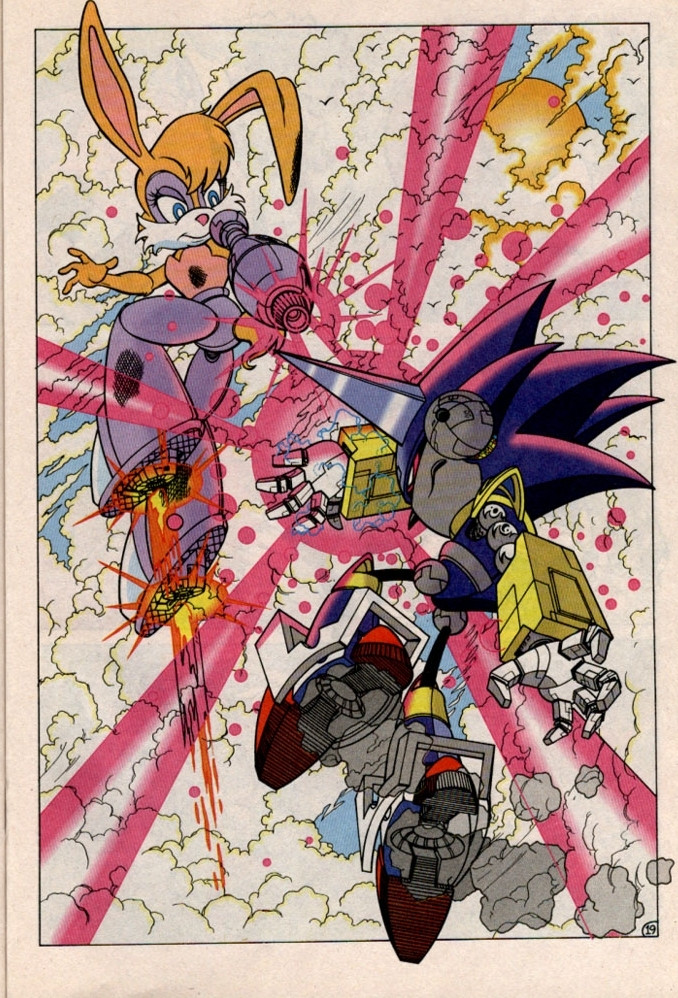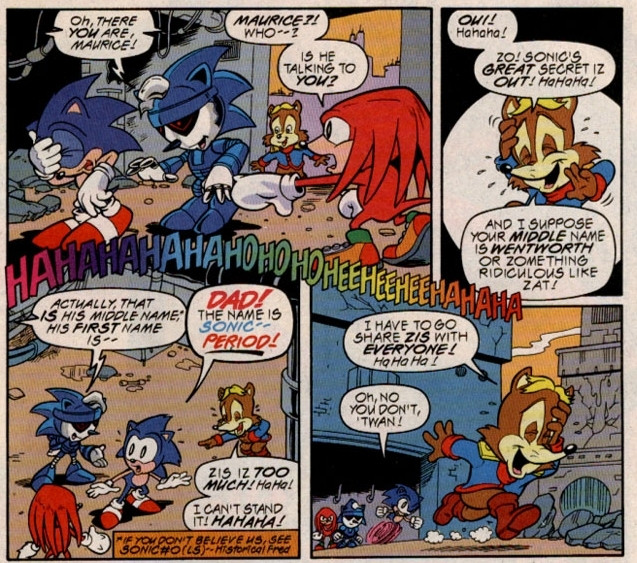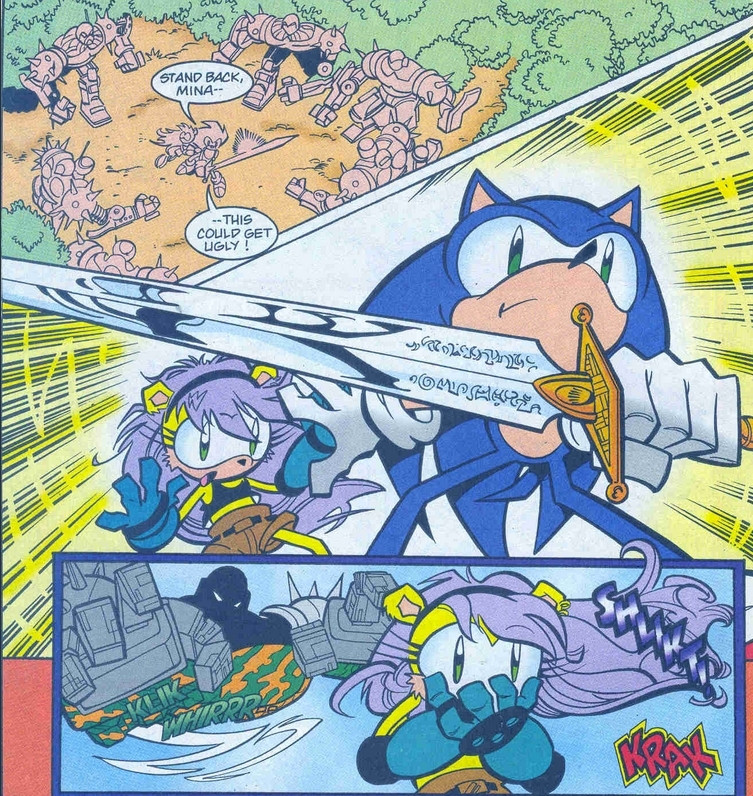So Yeah I've Been Reading Archie Sonic
5/31/2025

If you follow me on Bluesky, it's unmissable that I've taken up reading Sonic the Hedgehog as it was published by Archie Comics. Archie produced Sonic from 1993 to the end of 2016, and there are many, many Sonic comic books to read under Archie's tenure. If you're a fan of the popular Sonic Mega Collection compilation released on 6th generation game consoles, you'll recall a bonus feature where you could scroll through comic covers. I believe this was my first exposure to Sonic comics even existing. I also remember seeing them sometimes on the official Sonic website circa '04/'05. I had been to a few of my local comic book stores at that age, but I never actually found any of these Sonic comics.
While they were elusive to me at the time, I think it's fair to say they're a fascinating and important piece of Sonic the Hedgehog's history. Sonic comics still continue to draw in people who might not normally read monthly periodicals from the likes of, say, Marvel or DC. Today, "Archie Sonic" (as is easiest to say and write) is often brought up as the subject of jokes. Not wrongfully, either, as now the comics seem fairly off-brand and strange for how we know Sonic today. Sometimes they are really bad, regardless of the character and brand, but let's not be hasty. The fairly high profile lawsuit between Archie Comics and writer Ken Penders also put some fresh eyes on these comics.
I've always been deeply curious about it. Sure, you can glean a lot of the crazy stuff from summaries and single panels, but that never fully satiated me. "What happens in these?" I found myself asking from time to time.
Note that I'm not planning to cover every part of the series I've read up until this point. This is a vibes-based account of my reading experience thus far. If you want a far more complete look at (nearly) everything, I'll redirect you to Bobby Schroeder's "Thanks Ken Penders" blog. She goes through things issue by issue there. Her reading order list is also very useful, especially early on.
I'm The Sax-Cymbal Of This Team!

Sonic starts out as innocent and "kids comics" as they come. Initially strongly based on the ABC cartoon (best known as SatAM). Sonic's first 30~ish issues are a gag comedy through and through. Puns, puns, and more puns. But there are hints of drama and things crawling forward, like the introduction of the beloved Bunnie Rabbot, and an in-and-out story with Sonic's Uncle Chuck and Muttski. These issues range from kinda cute and amusing to completely groan-worthy. I was tempted to read every issue, though, because I wanted to see the transition into a more serious narrative for myself. So, how does that happen?
For the most part, somewhat slowly and inconsistently. The early Knuckles' solo stories could reasonably be described as darkening the tone a bit, but Sonic's stories flop around. There are random (well, they feel random when you're reading them) moments where they dip more into contemporary game ideas and stories. Issue #4 has Sonic actually go through special stages for Chaos Emeralds and fifty rings. It's very mismash at first, but I found it fairly charming at this early stage as the comic was finding its voice. Not so much later on.
That is, until the Mecha Madness storyline, which starts in Sonic #39 and continues into a 48-page Special. THIS STORY RIPS. I'm obsessed with this part. Bobby gave it her fair shake, but I think it's more than a "big dumb fight." This is an enormous ramping up of tension and danger for the main cast. Losing Sonic to Robotnik and having to fight him is practically an apocalyptic event for the Freedom Fighters. It also helps that Patrick Spaziante gets to do interiors for it, and his work is always outstanding. He's also on some early hits like #25, a Sonic CD adaptation that probably has more sauce than all the previous issues combined.
From then on, it's story and continuity world. And I really, really like it. There are multiple plots of interest in the way that comic books specifically can do so, so well. There's Sally's father, the drama between Geoffery St John and Sonic, the Endgame arc, and uh, Knuckles entire life.
A Brief Interlude On Knuckles
We must now make a note about Knuckles. I won't spend too long on this, but pretty much everything you've heard about Ken Penders' work with the character is true. It is awful. Knuckles' entire backstory and the Echidna world make less and less sense the more information gets revealed. Echidna society somehow live in a modern city with taxis and guns and police, but are still allegedly anti-technology and science. There are far more details to it, but it's gobbledegook by the end. There's also an infamous, enormous family tree to keep up with that becomes challenging to follow. At least for me.
I'll add this. Penders doesn't seem to have too many actual ideas for proper stories with Knuckles. The Knuckles miniseries is effectively an endless series of "OooOooOoo you have a greater purpose and destiny that you can't know," over and over and over again. It is nauseating. It's so terribly repetitive that Knuckles has basically ascended to godhood (and turned green) and is IN ECHIDNA HEAVEN and they STILL keep trying to pull "OooOooo" on him. It's insane. And then, when Knuckles is seemingly ripped away from Penders, he starts doing it to Tails! Gah!
The shocking monotony of it betrays the fact that the Knuckles miniseries is crazy. Knuckles' father, Locke, truly is a thoroughly awful character. He has an ant friend named Archemedes. There's...sort of a race war for a little while with the Echidnas and the Dingoes. It has to be read to be believed. How about Vector's quest for a girlfriend? It frequently defies not just general Sonic sensibilities (even interpreted loosely and at the time) but common sense.
Growing Pains
There's a period where I think the book is broadly, consistently strong. It would start at Mecha Madness and ends around the time that Sonic gets his Adventure look and that material starts to be adapted. So, we can roughly call it 40~70, or maybe more like 1996 to early 1999, because it's really not exact. There's also a few duds in there (Monkey Kahn), mind you. It's not suddenly Fantastic Four.

This period has that aforementioned Endgame story, which, while not perfect, definitely shows the strength that a regular wartime Sonic narrative can be. I think SatAM aficionados already knew, but it's impressive nonetheless. I was invested in what was going to happen to everybody, no suspension of disbelief required. It's an exciting comic completely on its own original merits by that point, having well outlived the cartoon it was sorta based on.
I can't quite find the words for how seeing Sonic (the character) in this new context has made me fall in love with him all over again. I never really disliked him, but I've never had a wholesome love for the series the way I did as a kid. It's hard to recapture that, but seeing Sonic be sad, angry, in love, a hero to everyone in Knothole... it's very touching to me! It can vary a lot by writer, but I found it refreshing that in these comics, he's not a completely invincible cool guy like he sometimes is in the video games. Sometimes. Sonic video games (outside of the Adventure duology, personally) don't have strong, consistent narrative threads or hooks the way the comic (sometimes) does. That's partly by nature of being video games, but Archie Sonic has had me yearning for more narrative in the games regardless.
I also greatly enjoyed the "No Eggman" period of the story that followed, as Sonic and Tails travel the world in search of Ixis Naugus, a wizard. "Brave New World" is a neat interlude, with a bit of its own weirdness (Knuckles really gets into full swing here, and you get to read the Image Comics crossover if you're curious), but again, original stuff is broadly strong here. The introduction of Nate Morgan and what he brings to the world was great.
Things start to go south around the end of 1999. You can sense that the book needs to evolve. Or, if not that, I expected some kind of changes to come, considering Sonic's new appearance was explained as being something that happened in universe. How would the comic explain Station Square, a human presence, and Chaos without rebooting itself? How do you bring back Eggman when he was fairly definitively killed?
It's...tricky.
Adventure is sort of sidelined as happening in a relatively ignorable place (as far as writing is concerned), Station Square is hidden away in an island nobody knew about, complete with an artificial sky. Eggman returns, originally a new body for Robo-Robotnik (another sort of one-off doppelganger), that veeeery slowly over the years just kind of gets accepted as Eggman. Kind of.
The problem that really starts to emerge through the early 00's is that it feels like there are many voices in the room that can't agree on what Sonic the Hedgehog is supposed to be. For every one step forward, there are two steps back. Designs for characters will frequently flop around, with Sonic in particular being a serious challenge, sometimes only barely following the mandate for his new design.
It's just nauseating. Watching the comic transform from a Looney Tunes comedy into a wartime drama was fascinating and cool, and gives some depth to everything. Watching it struggle to be almost anything normal is more challenging. This is the case even if we disregard monsters like #113, a SatAM style story with awful artwork published in late 2002. My nomination for worst issue still goes to Super Special #15, a comic with barely any artwork at all published in 2000. Good lord! Get yourself together, Archie!
If you're wondering how Sonic Adventure 2 plays out in the Archie world, it sort of doesn't. There's a teaser comic featuring some bits from the opening chapters of the game, but that's all you see. However, the events of Adventure 2 are said to have still happened in the Archie universe. This is odd, but hey, you've got to do something with Shadow, right?
Writer Ian Flynn comes onto the comic with issue #160, who you probably know from his entire Sonic career afterwards. I've just started that section, but I'm slowing down a bit to catch my breath after about 240 individual Sonic comics. Yes, really. The year or so before he comes on (2005-2006) is almost a full disaster. It's got some of the most corny, clearly bullshitting for drama stories in the ongoing web of romance that is Sonic the Hedgehog's life. It has frequent backup stories about characters like Dulcy the Dragon. In 2005! THIS IS WHEN TITAN TAILS HAPPENS.
Part of me is going to miss the quirks of Archie Sonic under Bollers, Penders, and the like. There's a ton of original stuff and characters that I like, there's a distinct flavor to the comic that I don't think you can get anywhere else. When it's enjoyable, it's a special comic, I will say that with my whole chest. But fuuuuck, when it's bad, it's a tough pill to swallow, tougher than I really expected. There's definitely been a kind of adrenaline for me in wondering just what the hell will happen next. Like, I don't know if "Sonic in space after fighting the Xorda aliens" tier of stuff is going to happen again under Flynn. So far, though, I'm impressed with his work. Getting rid of Pender's Evil/Anti Sonic and turning him into a more original character is a huge relief. Gawd.

This article already got way out of hand, so I'll leave with a few extras. I absolutely love Mina Mongoose. There's a few issues where Amy Rose just has a normal, human sledgehammer. Oops. Also, Amy using up the magical wish that would have saved Sally's mother so she can be older is deeply funny. You can forget about it eventually, but that happened.
By the way, I recommend reading original scans if you can find them. You get to see all the old ads and it just fits with the artwork and coloring, at least to me. It puts me back in time! I switched to reading the digital uploads on the "Return to Angel Island" story, but #160 would also be a reasonable place to do that, if it matters to you. I find the recolors of the older comics to be gaudy.
Hasta la vista for now!
- Jane the Cat